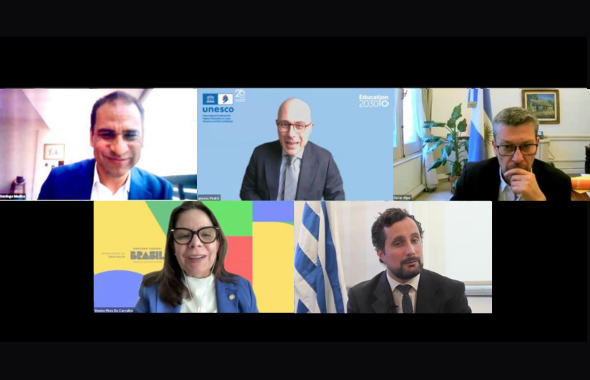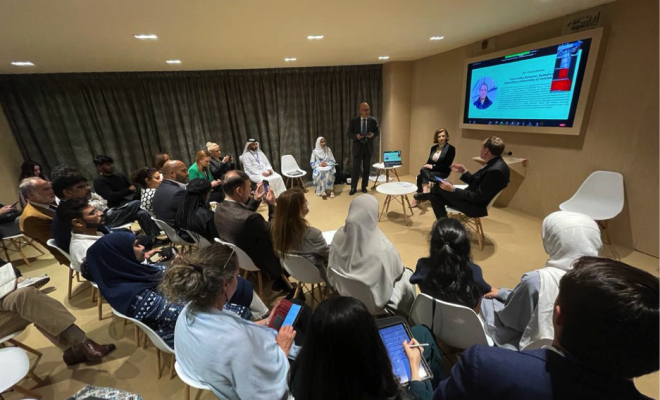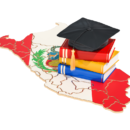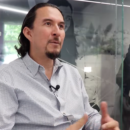Day 4 – Government representatives from Brazil, Argentina, Uruguay and Venezuela discussed achievements and challenges of higher education

On our fourth day of commemorative activities for the 25th anniversary of UNESCO IESALC, we had the participation of government representatives to address the achievements and challenges of higher education in Latin America and the Caribbean.
Participating in the online conversation were Denise Pires de Carvalho, Secretary of Higher Education of Brazil; Oscar Alpa, Secretary of University Policies of Argentina; Gonzalo Baroni, National Director of Education of the Eastern Republic of Uruguay and Domingo Medina, Vice-Minister for the Qualitative Transformation of University Education of the Ministry of Popular Power for University Education of Venezuela. All of them under the moderation of Francesc Pedró, Director of UNESCO IESALC.
Pires pointed out that Brazil’s socioeconomic development depends, to a certain extent, on higher education, which contributes to the generation of knowledge and technology. Although about 80% of enrollments are concentrated in private institutions, public universities have increased their number in the last 20 years, with presence in practically all the national territory: “95% of Brazilian scientific production occurs in public universities, of which about 70% are federal universities, responsible for most of the generation of knowledge in the last ten years”.
In 2012 there were 42 universities and 121 university campuses, today there are 69 and 300, respectively. Thanks to a policy of inclusion -through the quota law-, in these federal institutions 50% of the young people who enter come from different ethnic and economic backgrounds.
However, the challenges include the need to increase enrollment and retain students, since the number of graduates is 23%, while the OECD average is 47%, through student support programs so that the most vulnerable students, especially, can complete their studies.
It is also necessary to expand the quality and infrastructure, as well as the expansion of postgraduate programs -including those socially rooted and focused on native peoples-, to reduce inequalities and eradicate all forms of discrimination, to achieve international cooperation and to achieve the economic development of the country and the region.
In Argentina, as in the rest of the countries in the region, the increase in enrollment has been very significant: “In 1984, when democracy returned, there were 350,000 students; today we have 2.5 million students in the country, that is, we have multiplied the number of students by 7”. Likewise, the number of graduates has grown by more than 30% in recent years.
Of the total student body, 81% is in free public education and with unrestricted admission in the great majority of careers. To date, the country has around 120 universities distributed in all provinces, of which 57 are public, self-supporting and the sector receives 0.6% of the GDP.
He recalled that more than 100 years ago the first university reform was carried out, which contemplated the idea of co-government together with students and non-teaching staff, and university autonomy as a right. Today the university as an institution has 75% acceptance in society.
In university policies they have established some points such as: hybrid, bimodal, virtual and remote education; revision of academic proposals; broad admission, strict accreditation systems; search for formats that favor internationalization and research support programs.
In Uruguay there has not been an explosive growth of the educational system, but rather in accordance with the characteristics of the country, but which opened up a plurality of approaches and schools of thought.
They now have 2 public universities, 5 private universities, 10 university institutes and have extended the educational offer to the entire national territory, consolidating the supervisory role of the Ministry of Education and Culture, which has also strengthened teacher training in fundamental and digital competencies, as well as a revalidation mechanism that has allowed 1500 professionals to achieve, in just 6 months, the recognition of their degrees in Uruguay.
“Now, to talk about numbers, we have expanded the number of students and our graduates. We have gone from having 6800 enrolled in 1997 to 235,000 in the year 2021. We have gone from having 3,673 graduates in ’97 to 8775 in 2021. This is taking into account all the universities in the national territory. In recent years, we have created a National Agency for Innovation and Research, which has made a great contribution to research in our country. We have also had an active participation in the regional processes of accreditation, student mobility and research mobility, especially within the framework of Mercosur, our axis of integration”, Baroni pointed out.
He added that they are working to support different processes in different countries to achieve a greater flow of information, constant communication and achieve greater trust between the different countries: “In the case of Uruguay, we are especially concerned with quality assurance. Our agency is going to be installed on January 1. The Ministry of Education and Culture is working to strengthen and reinforce the process, to generate trust among the institutions, to have clear protocols for action and, above all, to have identified the good practices, but above all, what is the work we have to do ahead”.
In Venezuela, the 1999 Constitution establishes education as a human right and a public good, which imply inalienable responsibilities of the State. Medina pointed out that “we can speak not only of inclusion or increased access to university education, but we can speak in Venezuela of the universalization of access to university education.” In the last 4 years, 1200 high school graduates have entered the university system -including an indigenous university-.
Since 1998, 51 public universities have been created -of which 26 are territorial polytechnic universities focused on the development of productive capacities where they are located- for a total of 70, with presence in all Venezuelan states. This added to the policy of municipalization of university education with presence in 312 of the nation’s 335 municipalities, contributing to the fulfillment of Sustainable Development Goals 4 and the development of the country’s strategic areas.
“Currently, the percentage of the economically active population that has or has completed university studies is around 32%. In absolute terms, this means that we have gone from approximately 900,000 professionals to close to 4 million professionals in Venezuela in recent years”, said Medina.
He also commented on the support to intermediate or technical careers -18% of the economically active population- and to internationalization through two programs. Medina aspires to move towards a declaration of university education as a space free of coercive measures and to advance in the field of digital transformation and integration processes.
Pedró closed the rich conversation, thanking all participants for their presence and emphasized the fact of promoting synergies and cooperation to continue with the mission of UNESCO IESALC in these 25 years and for the future: to enable quality education for all people. He took the opportunity to invite to the next meeting in Asuncion, Paraguay, on November 22 and 23, in preparation for the Regional Conference on Higher Education+5, to be held in Brasilia (Brazil), in March 2024.
Other videos:
Transformative youth
In this video the protagonists are young people, who open innovative paths for the transformation of education and our societies.
The right to higher education
Emma Sabzalieva, researcher, talks about recent work and achievements that UNESCO IESALC team has done on the right to higher education (HE), specially the report “The right to higher education: A social justice perspective”
Artificial intelligence in higher education
Ariana Valentini, analyst, presents how the Institute has addressed the challenges and also the opportunities presented by the irruption of artificial intelligence in higher education.
Women’s participation in higher education
Daniele Vieira, a researcher, shares gender-related projects carried out at the Institute, including one on women’s participation in higher education in Africa.
RELATED ITEMS







